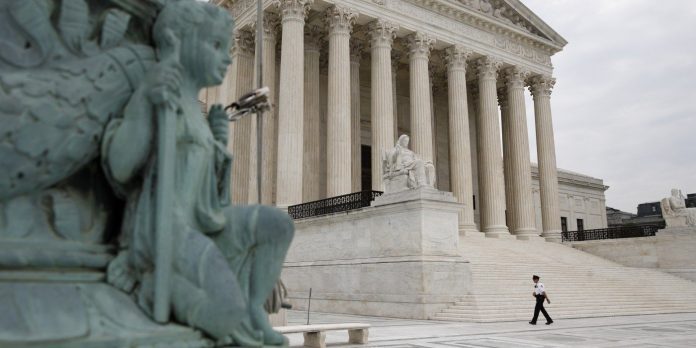(Liberty Headlines) Embittered by their belief—albeit disputed—that Hillary Clinton won the 2016 popular vote by roughly 2.8 million more total ballots, blue states have pushed recently to abolish the Electoral College, which serves as the last backstop between direct democracy and the presidency.
Several left-wing state legislatures have passed the National Popular Vote Interstate Compact saying they would force their electors to support the national popular-vote winner, regardless of how their own citizens may have voted.
Now, a unanimous Supreme Court verdict may have given that effort an extra boost as the states seek to exert added political pressure on the 538 representative delegates who must directly decide the presidency.
In a set of cases The court ruled Monday that states can require presidential electors to back their states’ popular vote winner in the Electoral College.
The issue arose in lawsuits filed by three Hillary Clinton electors in Washington state and one in Colorado who refused to vote for her despite her popular vote win in both states.
By so doing, they hoped to persuade enough electors in states won by Donald Trump to choose someone else and deny Trump the presidency.
But Justice Elena Kagan wrote for the court that a state may instruct “electors that they have no ground for reversing the vote of millions of its citizens. That direction accords with the Constitution—as well as with the trust of a Nation that here, We the People rule.”
The ruling was, undoubtedly, a win for the residents of the state in ensuring their votes counted, and that a handful of corrupt, rogue electors can’t undo the will of the people.
But it left unresolved the question of whether states might be allowed to enter into a compact to deny their own citizens’ choices in favor of a national vote-winner.
During a webinar last month hosted by the Committee for Justice, constitutional scholar John Malcolm, vice president of the Heritage Foundation’s Institute for Constitutional Government, said that it “could have a dramatic effect on the national popular vote” movement.
Malcolm noted that the framers of the founding documents had deliberately left room for interpretation in the authority it delegated to the electors tasked with sending one victor to the Oval Office.
“Article 2 of the Constitution gives states the power to appoint,” Malcolm said. But it does not specify how the electors must vote because the “framers did not intend for them to be merely a rubber stamp.”
That means the question as to whether the states, themselves, can be faithless to their own constituents remains yet unanswered.
Any sort of interstate compact, if it were to succeed in garnering the support of enough states, would be challenged as well.
Accountability for Electors

The ruling’s indirect implications for the National Popular Vote were one of several concerns the decision sought to remedy in an increasingly divisive political climate where election integrity is paramount to counter the deep mistrust in political institutions.
The ruling, just under four months before the 2020 election, leaves in place laws in 32 states and the District of Columbia that bind electors to vote for the popular-vote winner, and electors almost always do so anyway.
So-called faithless electors have not been critical to the outcome of a presidential election, but that could change in a race decided by just a few electoral votes. It takes 270 electoral votes to win the presidency.
In asking the Supreme Court to rule that states can require electors to vote for the state winner, Colorado had urged the justices not to wait until “the heat of a close presidential election.”
The justices had scheduled arguments for the spring so they could resolve the issue before the election, rather than amid a potential political crisis after the country votes.
When the court heard arguments by telephone in May because of the coronavirus outbreak, justices invoked fears of bribery and chaos if electors could cast their ballots regardless of the popular vote outcome in their states.
The federal appeals court in Denver ruled that electors can vote as they please, rejecting arguments that they must choose the popular-vote winner. In Washington, the state Supreme Court upheld a $1,000 fine against the three electors and rejected their claims.
In all, there were 10 faithless electors in 2016, including a fourth in Washington, a Democratic elector in Hawaii and two Republican electors in Texas. In addition, Democratic electors who said they would not vote for Clinton were replaced in Maine and Minnesota.
The closest Electoral College margin in recent years was in 2000, when Republican George W. Bush received 271 votes to 266 for Democrat Al Gore. One elector from Washington, D.C., left her ballot blank.
The Supreme Court played a decisive role in that election, ending a recount in Florida, where Bush held a 537-vote margin out of 6 million ballots cast.
The justices scheduled separate arguments in the Washington and Colorado cases after Justice Sonia Sotomayor belatedly removed herself from the Colorado case because she knows one of the plaintiffs.
Adapted from reporting by the Associated Press

